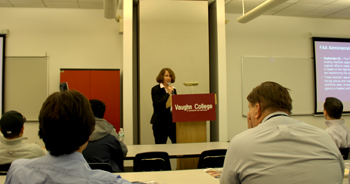
FAA Official Makes Pitch for NextGen in Vaughn Lecture
“Get ready. NextGen is coming, and it’s the wave of the future.”
That was the message Federal Aviation Administration official Nancy Risso brought to Vaughn College Wednesday night in a 90-minute presentation on the ongoing overhaul of the nation’s aerospace system, a lecture sponsored by the Society of Automotive Engineers International’s Metropolitan Section.
Risso, a former professional pilot and civil engineer and now the FAA’s NextGen Eastern Region branch manager, emphasized the need for the overhaul but asked the gallery for patience as it develops.
“Some things are maturing; some things are not,” Risso said to an audience of Vaughn students, faculty, SAE members and others.
NextGen is the most significant revision of the nation’s aerosopace system ever undertaken. Substantively, it involves transitioning from ground-based air traffic control to satellite technology. But, as Risso pointed out, it is more than merely a change in systems; it is a fundamental restructuring of the way the FAA will manage the nation’s airspace.
The FAA expects the system to be fully operational by 2020.
Hand in hand with changes in air traffic control technology are airport infrastructure changes and new flight procedures that include the shifting of some decision-making from the ground to the cockpit.
“It’s many projects, not a single project,” Risso explained.
The FAA maintains changes are needed to accommodate increased travel demand, safety and environmental concerns and anticipated rises in the cost of jet fuel. About $1 billion has been dedicated to the project in fiscal year 2011.
In a question-and-answer session following her presentation, Risso said she does not see NextGen as a threat to future air traffic control jobs.
“In my opinion, controllers are not going away,” she said. “I can’t see that happening.”

FAA official Nancy Risso discusses the NextGen air traffic management system at Vaughn Wednesday night.